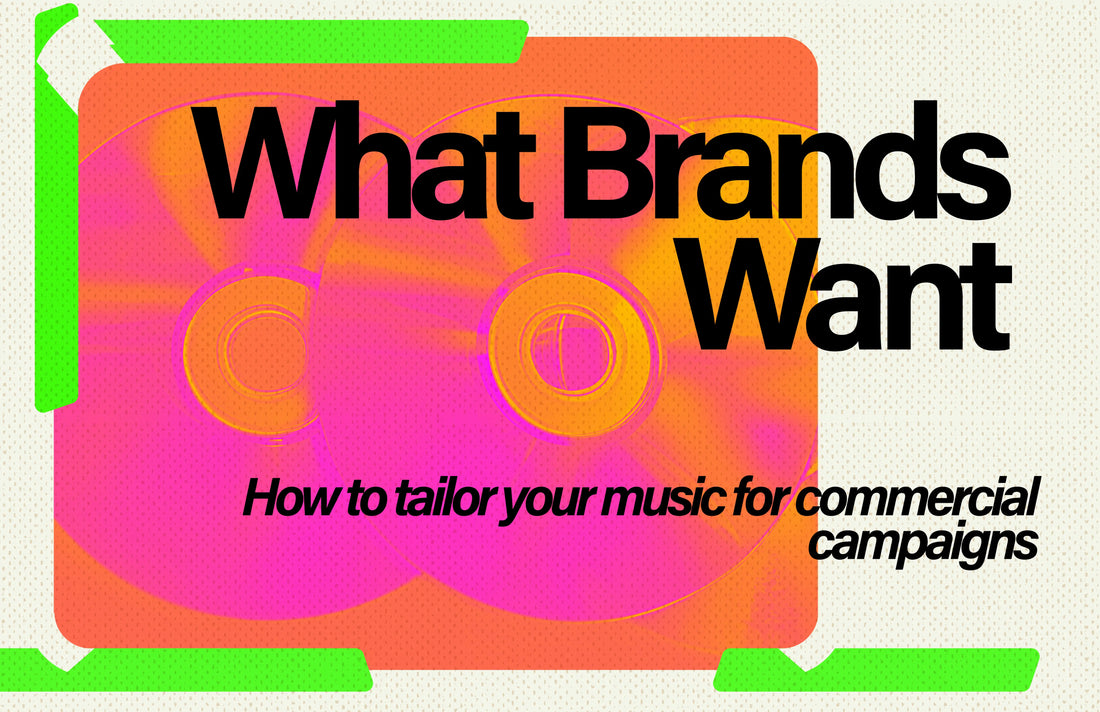
What Brands Want: How to Tailor Music for Commercial Campaigns
Share
Commercials aren’t just ads—they’re micro-stories with massive emotional power. And in 2025, as attention spans shrink and brand differentiation becomes harder than ever, music has become one of the most important tools in a marketer’s toolkit.
For composers, producers, and licensing artists, this means opportunity—if you know how to think like a brand.
In this post, we’ll break down what brands really want when it comes to music, how to align your tracks with their campaigns, and how to make your catalog appeal to modern marketing teams, music houses, and creative directors.
🎯 Why Brands Care So Much About Music
Music does what visuals alone can’t:
- Sets tone in seconds
- Drives emotional response
- Shapes brand identity and memorability
From Nike to Shopify to indie DTC startups, brands are using music not just as a background element—but as a strategic branding asset. They want music that feels custom, emotionally aligned, and reflective of their values and audience.
🔊 “It sounds like us” is just as important as “It sounds good.”
🧠 What Brands Are Looking For in 2025
1. Emotional Precision
Modern brands want music that reflects their personality and resonates emotionally with their target audience. Whether it’s bold and aspirational or warm and nostalgic, the tone must match the campaign narrative.
🎯 Pro Tip: Watch a brand’s previous ads. You’ll see patterns—musical tone, genre, tempo—that inform their emotional sweet spot.
2. Sonic Consistency Across Channels
Your music may appear in:
- TV spots
- Instagram reels
- YouTube pre-roll
- Podcast ads
- In-store content
- App onboarding flows
Brands now want multi-format consistency—tracks that can work across all platforms and adapt to different lengths without losing their essence.
3. On-Brand Identity
Music is now part of a brand’s voice. Just like logos, fonts, and taglines, companies want audio that feels:
- Recognizable
- Distinct
- Aligned with their values and audience
🧠 Think: What would Patagonia sound like? Apple? Red Bull? Each has a sonic fingerprint.
4. Lyrics That Reflect the Message
If a brand uses a vocal track, they want lyrics that:
- Are universal, not overly personal
- Align with the campaign theme
- Avoid language that contradicts brand values
✅ Examples: “Shine brighter,” “Be bold,” “Keep moving forward”
❌ Avoid: breakup themes, profanity, anything too niche or narrative-specific
5. Flexibility + Alternate Versions
Ad editors often need:
- 15-, 30-, and 60-second versions
- Instrumentals and cutdowns
- Loopable segments
- No vocal / no drums versions
If your music only exists in one version, it limits its licensing potential.
🎛️ Deliver your music like a toolkit, not a locked box.
🛠️ How to Tailor Your Music for Ads
✅ Start With the End Use in Mind
Ask: Where could this track live? What kind of brand or product would use it?
Use reference ads or brand archetypes to reverse-engineer tone and genre.
✅ Use Sync-Friendly Structure
Start strong, build momentum, and end with a clean button or tail. Avoid long intros or unpredictable changes—brands need clean emotional arcs in short formats.
✅ Match Brand Archetypes
Brands often fit into categories with consistent emotional tones:
| Archetype | Sound Example |
|---|---|
| The Hero (Nike, BMW) | Bold, percussive, cinematic |
| The Innocent (Dove, Etsy) | Soft piano, acoustic, ambient textures |
| The Rebel (Diesel, Liquid Death) | Gritty, energetic, distorted guitars |
| The Explorer (Patagonia, REI) | Organic, adventurous, indie folk or hybrid |
✅ Keep It Human
AI music is rising, but human-crafted tracks still resonate more. Add subtle imperfections, emotional dynamics, and organic textures. Don’t be afraid to let your humanity show.
📦 Packaging Your Music for Brands
- Curate playlists by mood and brand fit (e.g., “Confident Indie for Tech,” “Warm Piano for Wellness”)
- Tag tracks with brand-relevant keywords: empowering, confident, playful, heartfelt
- Include a one-sheet or deck that speaks to brand value, not just musical talent
- Have a quick-access licensing page or DISCO playlist for pitching
🚀 Final Thoughts
Brands don’t license music just to fill space—they license music that helps them connect, convert, and leave a lasting impression. When you can speak their language emotionally, structurally, and strategically, your music becomes a tool they can’t live without.
So if you're ready to work with brands, remember: you're not just composing music—you're creating brand moments.
Want help curating or pitching your catalog for advertising campaigns?
🎧 Partner with Playbutton Media — we specialize in crafting sync strategies for composers, producers, and licensing artists ready to serve modern brands.
